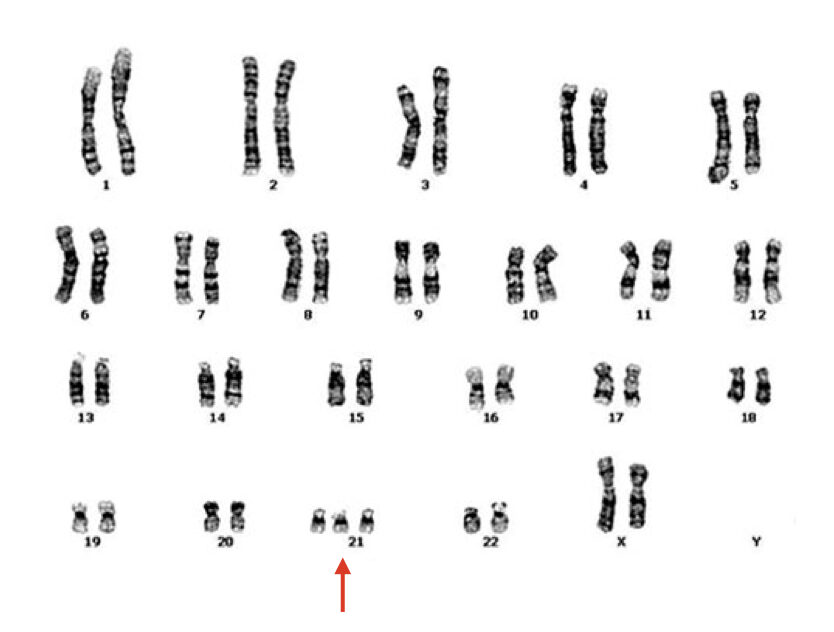Can our canine companions experience a condition akin to Down syndrome, or is this a purely human affliction? The answer, surprisingly complex, reveals that while dogs cannot be diagnosed with Down syndrome in the strictest sense, they can indeed suffer from chromosomal abnormalities and exhibit similar symptoms, requiring specialized care and understanding.
Down syndrome, often referred to as trisomy 21, is a genetic condition marked by the presence of an extra copy of chromosome 21. This chromosomal anomaly leads to a range of physical and cognitive developmental delays and disabilities. In humans, this extra genetic material disrupts typical development, impacting physical features, intellectual abilities, and overall health. However, the biological landscape of dogs differs significantly from that of humans, particularly in terms of their chromosomal makeup. Dogs possess 78 chromosomes, while humans have 46. Because Down syndrome is defined by having 47 chromosomes (23 sets plus the extra copy of chromosome 21), it can't be diagnosed in dogs.
The term "Down syndrome in dogs" is often used, it's more accurate to recognize the possibility of similar chromosomal abnormalities. Although they can't have Down syndrome per se, animals can suffer from cognitive disabilities other than trisomy 21. Dogs can experience other congenital or genetic conditions that are similar to those associated with Down syndrome. These abnormalities can arise from various factors, contributing to physical and cognitive challenges. Dogs with similar types of chromosomal abnormalities usually experience early mortality.
- Unpacking The Mysterious World Of Masa49 Org A Comprehensive Guide
- 1tamilblasters New Link 2025 The Ultimate Guide For Movie Enthusiasts
The core of the matter lies in the specifics of canine genetics. While dogs do not have the exact same chromosomal structure as humans, they can experience a number of genetic and chromosomal variations. The causes of these abnormalities in dogs can include:
- Chromosomal abnormalities: As in humans, these are often random events during the development of the egg or sperm, or early in embryonic development.
- Genetic mutations: Specific genes can mutate, leading to developmental problems.
- Environmental factors: Although less studied than in humans, environmental influences might also play a role.
While genetic testing can be done on dogs, there is no definitive test like there is for humans. Genetic testing specifically for identifying trisomy 21 in dogs has not been widely conducted. As a result, diagnosis usually relies on observing symptoms and conducting thorough veterinary examinations.
Dogs who have these chromosomal abnormalities may exhibit a number of symptoms. These symptoms can be categorized as:
- Bollyflix Com Your Ultimate Guide To Bollywood Entertainment
- Bollyflix Movie Download In Hindi Your Ultimate Guide To Bollywood Entertainment
- Physical features: Dogs with chromosomal abnormalities may exhibit distinctive facial features, such as a wider face, a flatter nose, and smaller ears.
- Cognitive differences: They often display slower development, learning difficulties, and may struggle with training.
- Health issues: Heart defects, vision and hearing problems, and thyroid issues are more common in dogs with chromosomal abnormalities.
The manifestation of these symptoms can vary. Some dogs may have only mild symptoms, while others may have more pronounced physical or cognitive challenges, meaning that each case is unique. It's a complex interplay of genetics and individual characteristics, and this variation underscores the importance of personalized care.
Interestingly, Down syndrome is not a contagious disease. It is a congenital condition, meaning it's a birth defect. The condition is caused by having an extra copy (or a partial copy) of chromosome 21. Thats why this is also known as trisomy 21. The condition is caused by having an extra copy (or a partial copy) of chromosome 21.
There are three types of Down syndrome in humans: Trisomy 21 (nondisjunction), translocation, and mosaicism, with trisomy 21 accounting for 95% of known cases. Down syndrome (also known as trisomy 21) is not some disease thats contagious.
Here's a breakdown of the common types:
- Trisomy 21 (Nondisjunction): This is the most common type, accounting for about 95% of cases. It occurs when there is an extra copy of chromosome 21 in every cell of the body. This extra chromosome is typically caused by a nondisjunction event during cell division (meiosis).
- Translocation: This accounts for approximately 3% of cases. In translocation, a portion of chromosome 21 breaks off during cell division and attaches to another chromosome. The most common translocation involves chromosome 14. The total number of chromosomes is 46, but the presence of extra material from chromosome 21 causes the same effects as trisomy 21.
- Mosaicism: This is the rarest form, affecting about 2% of people with Down syndrome. In mosaicism, some cells have the usual two copies of chromosome 21, while other cells have three copies. This often results in milder symptoms because there are some normal cells.
These genetic conditions may manifest in symptoms and physical characteristics that resemble down syndrome. These are called trisomy 21, translocation, and mosaicism. Trisomy 21 is a consequence of the unequal distribution of chromosomes during meiosis. Genes are a sequence of genetic code (DNA & RNA).
The challenges faced by dogs with these conditions often require a tailored approach. This includes:
- Specialized veterinary care: Regular check-ups, addressing any health issues promptly.
- Nutritional considerations: A balanced diet to support overall health.
- Environmental enrichment: Providing a stimulating environment with appropriate toys and activities.
- Behavioral support: Gentle training methods, patience, and consistency.
The increasing recognition of these canine conditions underscores a growing awareness of the diverse needs of animals. Just like humans, dogs can also have special needs and health conditions that require extra care and attention. One such condition that is becoming more recognized in the canine world is related to conditions similar to Down syndrome.
Care for these dogs requires dedication and understanding. It also highlights the profound bond between humans and animals, demonstrating that compassion and empathy extend beyond species boundaries. The focus should always remain on the quality of life for these animals, providing them with the love, care, and support they deserve.
This article is not intended to substitute for professional veterinary advice. If you suspect your dog may have any health issues, consult a veterinarian.
- Khatrimazafull The Ultimate Guide To Your Favorite Movie Streaming Hub
- Aagmaal Givescom The Ultimate Guide To Generosity And Community Impact


